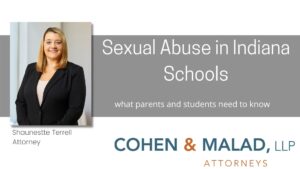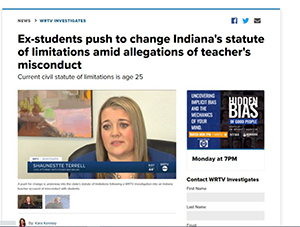It is estimated that 1 out of every 10 children will experience sexual misconduct at the hands of a trusted teacher, coach, or other school official ... Read More
molestation
FBI Investigates Sexual Abuse Claims Within New Orleans Catholic Church
By: Shaunestte Terrell, Attorney News of a federal investigation into sexual abuse claims within the Catholic Church in New Orleans has gained ... Read More
Sexual Assault: How the Burden of Proof in a Criminal Prosecution Can Affect a Civil Lawsuit
By: Amina A. Thomas, Attorney The New York Times’ Monday morning headline this week was a report on How Rape Cases Get Dropped. The article ... Read More
Sexual Abuse in Indiana Schools
VIDEO: A discussion with attorney Shaunestte Terrell Talk with Shaunestte Learn more about how Cohen & Malad, LLP's sexual abuse litigation ... Read More
Sexual Assault Statutes of Limitations: Archaic, Arbitrary, Absurd Deadlines
By: Shaunestte Terrell, Attorney Anyone who’s ever taken in an episode of Law & Order (or even Night Court back in the day) has heard that ... Read More
How to Help Sexually Abused Children Suffering from PTSD and Other Psychological Injuries
By: Gregory L. Laker, Attorney Tragically, we have seen an alarming increase in the sexual abuse of Indiana children recently. We shook our head in ... Read More







